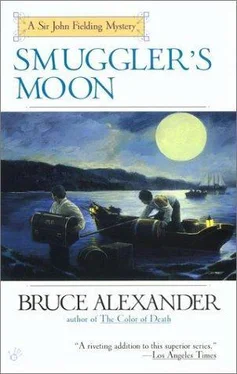Bruce Alexander - Smuggler's Moon
Здесь есть возможность читать онлайн «Bruce Alexander - Smuggler's Moon» весь текст электронной книги совершенно бесплатно (целиком полную версию без сокращений). В некоторых случаях можно слушать аудио, скачать через торрент в формате fb2 и присутствует краткое содержание. Жанр: Исторический детектив, на английском языке. Описание произведения, (предисловие) а так же отзывы посетителей доступны на портале библиотеки ЛибКат.
- Название:Smuggler's Moon
- Автор:
- Жанр:
- Год:неизвестен
- ISBN:нет данных
- Рейтинг книги:4 / 5. Голосов: 1
-
Избранное:Добавить в избранное
- Отзывы:
-
Ваша оценка:
- 80
- 1
- 2
- 3
- 4
- 5
Smuggler's Moon: краткое содержание, описание и аннотация
Предлагаем к чтению аннотацию, описание, краткое содержание или предисловие (зависит от того, что написал сам автор книги «Smuggler's Moon»). Если вы не нашли необходимую информацию о книге — напишите в комментариях, мы постараемся отыскать её.
Smuggler's Moon — читать онлайн бесплатно полную книгу (весь текст) целиком
Ниже представлен текст книги, разбитый по страницам. Система сохранения места последней прочитанной страницы, позволяет с удобством читать онлайн бесплатно книгу «Smuggler's Moon», без необходимости каждый раз заново искать на чём Вы остановились. Поставьте закладку, и сможете в любой момент перейти на страницу, на которой закончили чтение.
Интервал:
Закладка:
Albert Sarton smiled a rather crooked smile. It seemed to give him a mischievous look. ”I shall do that, sir,” said he. ”And I look forward to our meeting in the morning.”
I saw this as my last opportunity to say to him something I felt needed to be said. Clearing my throat and lowering my voice (that the waiting driver might not hear), I said to Mr. Sarton: ”Before you go, sir, there is something I heard from Will Fowler whilst riding beside him that I think you should know.”
“Then tell me by all means, young sir,” said he.
“I learned from him that he was not alone when he found the body. Mistress Clarissa Roundtree, who traveled from London as one of our party, was with him.”
”She is our ward, more or less,” Sir John interjected. ”Lady Fielding employs her as her secretary.”
“I see,” said Mr. Sarton. ”Well, by all means bring her along. I should like to hear her version of the event.” He paused then just long enough to bow a proper bow to Sir John and me. ”I thank you both,” said he. ”Until tomorrow.”
And with a wave of his hand, he was gone.
Though greatly interested in my meeting with Dick Dickens, and of all that Constable Perkins had to say of his former employer, rather than discuss it at length, Sir John chose to retire to bed for a nap. He admitted he had tumbled to the floor of the coach when Will Fowler had made that wild stop, but he insisted that he was in no wise crippled by the fall.
“You, as I,” said he, ”must allow that as I grow older my body seems to need greater rest.”
“Nevertheless, I do believe, sir, that you have pain in a particular place. Now, where is that?”
“Oh … my hip, if you must know, my left hip. It was there I hit the floor of the coach.”
“Well then, I agree that a rest is in order-and perhaps later, a doctor should be summoned to have a look at you.”
“No doctors,” said he, ”no surgeons, no provincial saw-your-bones. If I have need, I shall wait till we return to London and put myself at the mercy of Mr. Donnelly. He’s the only doctor I trust.”
And that, reader, put an end to the discussion. There is a certain tone of voice adopted by Sir John when he wishes to make it plain that he will brook no argument, and that last, ”provincial saw-your-bones” speech was spoken in that tone. I said nothing more, helped him undress, and assisted him into bed. Then, remembering to take with me Laurence Sterne’s Sentimental Journey , I tiptoed out of the room, convinced that he was already asleep. Then did I most quietly close the door behind me.
The room across the hall, which I recognized as Clarissa’s, had attracted the attention of a maid at the time I accompanied Sir John to our door. She was just finishing up with her broom when she spied us. Of a sudden she did drop her broom and deliver a curtsey with a brightly spoken, ”Good day to you, sirs.”
So taken aback was I by this that I could only think to say, ”Good day to you and … carry on.”
Having said that, I did throw open the door to our room and show Sir John the way inside.
I had all but forgotten the incident when I stepped out into the hall. I was reminded of it only in noting that the courteous maid was no longer about. My original intention was to go to the library where I might read for an hour or two before looking in on Sir John. But having noted Clarissa’s door, I wondered if I might not visit her and hear her story of the discovery of the body. There could be no harm in it, I told myself, so long as there was no such foolishness as last evening’s kissing games.
Assuring myself that there would be nothing of the kind, I knocked softly upon her door. For some several moments there was no sound beyond the door. It occurred to me that she, too, might have taken it into her head to go down to the library. But no: there was a sound and another and another. Clarissa was inside, right enough, and she was coming to the door.
“Who is there?” she asked. But was it Clarissa? The voice I heard seemed lower, huskier, than hers.
“It is I, Jeremy,” said I and waited-yet there was no move to open the door. ”Let me in.”
“I cannot,” said she.
“What do you mean? Why not?” Was she ill? Not properly dressed?
”The door is locked.” It was suddenly rattled from the other side. ”There, you see?”
I grabbed the latch and tried the door myself. It did not budge. I rattled it, and it still did not budge. Yet between us we had loosed the key from the keyhole. Big as it was, it dropped with a clang to the floor.
“Wait a moment,” said I. ”There is a key.”
“Well, use it, you dolt!”
Sharp-tongued as ever. I’d a notion to drop the key in my pocket and walk away, leaving her to shift for herself-but I did nothing of the kind. No, I jammed it into the keyhole, turned it, and threw open the door. As it opened inward, I managed somehow to bestow a bump upon her forehead. (Thus, without quite willing it so, I had my revenge upon Clarissa.)
“Ow!” She clapped a hand to her head.
“Sorry! Truly, I am sorry!”
“Such twaddle! If you were that regretful, you would come up with phrases that would comfort me more.”
“Such as?”
“Oh, I don’t know. It’s not my place to think them up. Men are supposed to have such phrases always upon their tongues.” Such notions came from her constant reading of romances. ”Why don’t you?” she demanded.
“Because I do not read the same books as you do,” said I proudly.
“No, I suppose you don’t. Well, the least you can do is throw your arms about me and comfort me with a few gentle pats upon the back. I’ve been weeping, you know.”
Kicking the door shut, I stepped close and took a good look at her face. Ah yes, her eyes were red and a bit puffy; her nose was sniffly; and her voice had, as previously noted, grown husky.
“So you have,” said I. ”But why?”
“Why? The heroine always weeps when she is imprisoned.”
”You weren’t imprisoned,” said I. ”Someone simply turned the key in the lock by mistake-probably that little maid who was so well-mannered.”
“What are you talking about?”
“Oh, never mind. But here now, this is all the consolation you’ll get from me.”
So saying, I wrapped my arms awkwardly about her and delivered a few perfunctory pats. As I did so, I happened to look over her shoulder at the carpet upon which we stood. Its dark pattern was interrupted by crisscrossing marks of white. I had stared at them curiously for a bit until I realized that the marks were, in fact, footprints, and the white was the same chalk white which covered the soles and heels of the dead man’s shoes in the wood. Releasing Clarissa, I turned her round and pointed down at the carpet.
“Are those your footprints?”
“Yes, they are. I’m afraid I’ve made a mess here. It’s chalk, you know.”
“Indeed I do know. Mr. Sarton, the magistrate here, pointed that out to us when we viewed the remains of the victim. Chalk was all over the shoes of the poor man. Yet the odd thing was that there was no place thereabouts that he could have picked up the chalk on the soles of his shoes, and so he came to the conclusion that the body had been moved.”
“But that’s nonsense,” cried Clarissa.
“No, I thought it was quite reasonable, and so did Sir John.”
“Yet it is only so if you did view the body in another place from that where I found him.”
“You found him? You mean where you and Will Fowler found him, don’t you?”
“No, I found him first, and then I took Mr. Fowler to see.”
“Just a moment,” said I, ”perhaps, Clarissa, you had best tell me the story from the beginning.”
Читать дальшеИнтервал:
Закладка:
Похожие книги на «Smuggler's Moon»
Представляем Вашему вниманию похожие книги на «Smuggler's Moon» списком для выбора. Мы отобрали схожую по названию и смыслу литературу в надежде предоставить читателям больше вариантов отыскать новые, интересные, ещё непрочитанные произведения.
Обсуждение, отзывы о книге «Smuggler's Moon» и просто собственные мнения читателей. Оставьте ваши комментарии, напишите, что Вы думаете о произведении, его смысле или главных героях. Укажите что конкретно понравилось, а что нет, и почему Вы так считаете.












